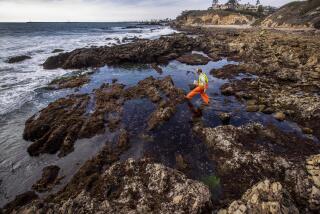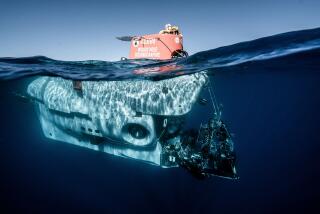Going for the Goo : Firm Teaches Crews How to Respond to Offshore Oil Spills
The 10 students had already gone over the theory behind removing oily goo from the ocean.
Now they were gathered around a 60,000-gallon tank in a cavernous warehouse, ready to actually operate the machinery that will help them filter oil from the sea in the event of a massive spill.
“Eventually, they will go out on the high seas,” said Frank Pellegrini, who has been supervising classes such as these at the Marine Spill Response Corp. in Port Hueneme for the past year. “But for an introduction on how to use this equipment, (this tank) is ideal.”
Instructors such as Pellegrini have been working to train the crews that will respond to oil spills the size of the 11-million-gallon disaster that fouled Alaska’s Prince William Sound four years ago.
The Oil Pollution Act of 1990, enacted in response to that disaster, mandated that oil companies be prepared to clean up any large oil spill they might cause. Oil industry leaders formed the privately funded Marine Spill Response Corp. and designated five regional centers nationwide.
The center in Port Hueneme is headquarters for the Southwest Region, which encompasses California, Hawaii and their waters. The federal law requires the regional center to be ready with trained crews by Aug. 20 to respond immediately in the event of another large spill.
When the more than four months of training is completed in May, the Marine Spill Response Corp. will have 69 people trained in oil cleanup, Pellegrini said. Fifty-three of them will be based in Port Hueneme and the rest at outposts in the Port of Richmond in Northern California and in Honolulu.
In the more than 3,000 hours of classroom training offered in January, the cleanup workers learned everything from how to operate cranes and forklifts to understanding the physics of hydraulic machinery.
Wednesday’s busy schedule was typical of the speed with which the nonprofit corporation is moving to meet the August deadline. In one room of the spacious, newly built administrative building on property leased at the Port of Hueneme, eight people are being trained in the basics of hydraulics.
In an adjoining room, a trio of students crowd around a bank of computers that will be used during a spill to track the oil’s flow and speed. In event of a major spill, the classrooms will be converted into a command post to keep track of the cleanup progress minute by minute, said corporation spokesman John McLaurin.
But the centerpiece of the company’s training efforts lies in a 90,000-square-foot warehouse next to the administrative building. The warehouse is home to the 60,000-gallon training tank used to teach workers how to operate skimmers, booms and other sophisticated cleanup equipment.
Instructors Linda Brown and Jim Bruss demonstrated how to lower the skimmer into the water at just the right speed and height to allow the maximum amount of oil to be sucked from the sea and pumped onto huge tank barges.
Each student took a turn at operating the skimmer. Portholes built into the sides of the tank permit easy underwater viewing of the equipment’s operation, Pellegrini said. In some classes, crude oil is poured into the tank, and the students must remove it, he said.
“This gives us a controlled environment,” Pellegrini said of the tank. “Students can hear what we say and stay focused on the lesson, rather than worrying about six- to eight-foot waves breaking over them,” he said.
Most of those being trained as cleanup crews have backgrounds in the marine industry, from fishermen to former Coast Guard employees, Pellegrini said. The regional center also trains fishermen during a three-day course that prepares them to serve as reserve workers for cleanup operations, he said.
In upcoming months, the Port Hueneme center will also train employees of the oil companies that fund the Marine Spill Response Corp. The Southwest Region’s operating budget for 1993 is $7 million, officials said.
More to Read
Sign up for Essential California
The most important California stories and recommendations in your inbox every morning.
You may occasionally receive promotional content from the Los Angeles Times.










